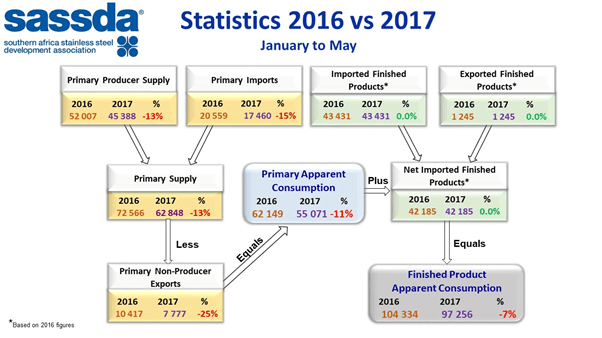The harsh reality currently facing our industry is that imported finished products, primarily Chinese, surged by 44% last year (this is supported by anecdotal evidence and feedback from the sassda member survey) and the export of finished products dropped by 20%. So, whereas in 2015 we were a net exporter of stainless steel finished products and exported.

8 000 tons more than we imported, we now import 40 000 tons of stainless steel finished products more than we exported and therefore run a trade deficit on stainless steel finished products.
Sassda is therefore seeking to start the process of increasing the import tariff (i.e. increasing the applied rate to the bound rate) on six HS codes in the downstream stainless steel industry that we have identified as showing large increases in import volumes over the last year. An initial analysis of the statistics indicates that the list of items where the applied rate could be increased include:
- Reservoirs, tanks, vats and similar containers of a capacity exceeding 300 litres,
- Distilling plant or rectifying plant,
- Machinery for the preparation of meat or poultry,
- Machinery for making paper or paperboard,
- Hollowware for kitchen or table use, other
- Dairy equipment
Sassda will refine the list based on feedback from members and then liaise with XA International Trade Advisors to assist with this process and advise us of the way forward. NB. Please contact sassda should you wish us to investigate other products where you think that there has been a surge in imports. (lesley@sassda.co.za)
Members who produce these products would be asked to join a consortium to apply to the International Trade Administration Commission of South Africa (ITAC) to increase the tariffs. The cost per application is about R100 000 to R200 000, depending on the number of companies taking part in the investigation (the more companies that take part, the higher the total costs of the investigation, but the lower the costs per company). This is because a consortium has more power than an individual company to influence decisions at ITAC. For more information or to share your views, please e-mail john@sassda.co.za

